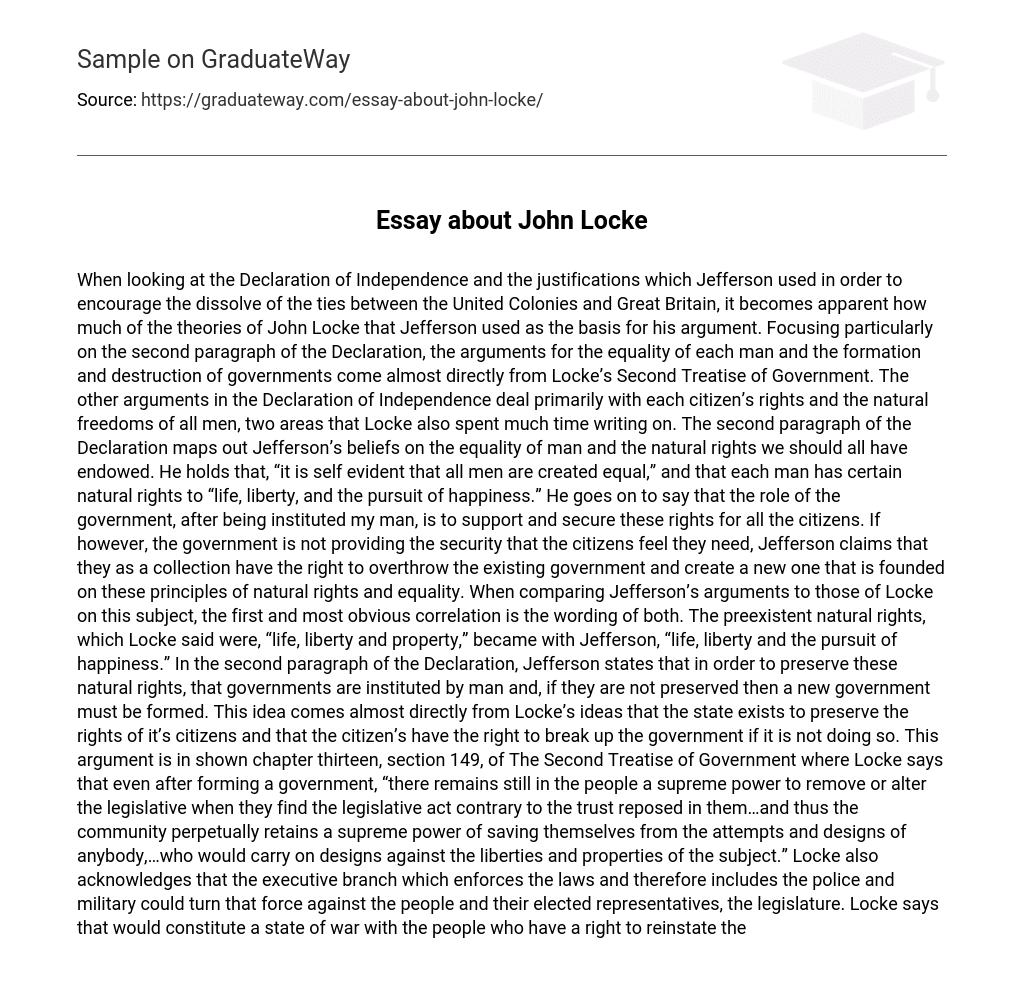Jefferson heavily relied on John Locke’s theories when justifying the separation of the United Colonies from Great Britain in the Declaration of Independence. Particularly, the arguments related to the equality of individuals and the formation and destruction of governments were drawn directly from Locke’s Second Treatise of Government. Furthermore, other arguments within the Declaration focused on citizen rights and the natural freedoms of all individuals, which were also topics extensively discussed by Locke. In the second paragraph, Jefferson outlines his beliefs regarding the equality of men and the inherent rights that every individual should possess. He asserts that it is evident that all men are created equal and are entitled to certain natural rights, such as life, liberty, and the pursuit of happiness. According to Jefferson, once a government is established by individuals, its role is to protect and ensure these rights for all citizens. However, if the government fails to provide adequate security, Jefferson maintains that the collective citizenry possesses the right to overthrow the existing government and establish a new one based on these principles of natural rights and equality.The correlation between Jefferson’s arguments and Locke’s arguments on this subject is evident in their wording. Locke identified the preexistent natural rights as “life, liberty and property,” while Jefferson replaced “property” with “the pursuit of happiness.” In the second paragraph of the Declaration, Jefferson suggests that governments are established by individuals to protect these natural rights, and if these rights are not preserved, individuals must create a new government. This concept closely mirrors Locke’s belief that governments exist to safeguard citizens’ rights, and citizens have the right to dissolve or alter the government if it fails in this duty. Locke articulates this argument in chapter thirteen, section 149 of The Second Treatise of Government, stating that even after the formation of a government, the people possess a supreme power to remove or change the legislative if it violates their trust. Furthermore, Locke acknowledges the possibility that the executive branch, which includes law enforcement and military forces, could misuse their power against the people and their elected representatives in the legislature.According to Locke, the actions described would create a state of war between the people and those who possess the authority to restore their government. Jefferson applied this concept specifically when justifying his decision to separate from Britain, as he believed Britain had employed its military strength against the colonies’ inhabitants, consequently initiating a state of war between the two parties.
In chapter nine, sections 123 through 126 of The Second Treatise of Government, Locke explores the purposes of political society and government. He emphasizes that individuals relinquish their innate state of complete liberty in exchange for enhanced security and protection of their lives and property. Additionally, Locke highlights the advantages of government such as the ability to establish universally applicable laws, impartial judges to administer those laws, and an executive authority responsible for enforcing laws and punishing transgressors. While acknowledging that individuals surrender certain powers and equality when joining a government, Locke asserts that it is the duty of the government to fulfill these aforementioned benefits. In chapter nineteen, Locke outlines the justifications for rebelling against a government. He argues that if the legislative body undergoes changes or dissolution, the government also dissolves. This occurs if a single individual, such as the king in Britain, replaces existing laws with his own without the consent of the people. Such actions may include raising or modifying taxes or enforcing laws against citizen consent. The legislative body is also considered changed if the king obstructs its meetings, suppresses its freedom of action, or denies it participation in law formation.Jefferson also utilized this reasoning, stating that the King of England had sought to impose his laws upon the citizens of the Colonies without their consent, excluding their representatives from participating in Parliament. Other justifications for severing the ties between the Colonies and Britain revolve around Locke’s belief that individuals should have authority over their own lives and choices, as long as it does not infringe upon the rights of others to life, liberty, and property. Thus, when Jefferson argues against Britain’s laws such as the quartering of soldiers in civilian homes and taxation without representation, he draws inspiration from chapter two, section four of Locke’s Second Treatise of Government. This section asserts that freedom entails being free from the domination of another individual and possessing the autonomy and power to pursue one’s desires with respect to personal life and property. This emphasis on personal freedom, emphasized by Locke, is commonly known as negative freedom. Section six further adds that this freedom is subject to reasonable limitations and restricted by adherence to the laws of nature.
Bibliography: none





